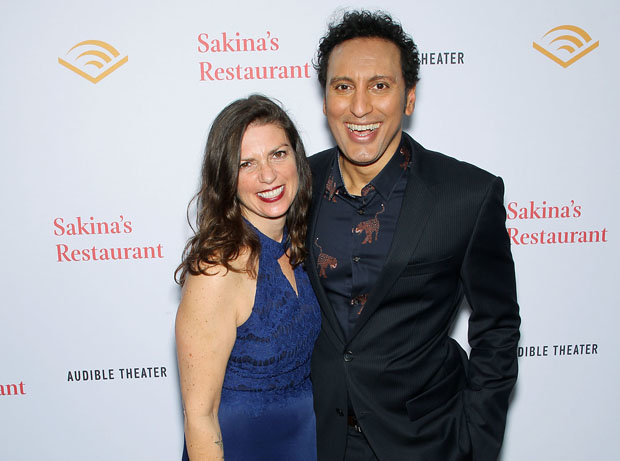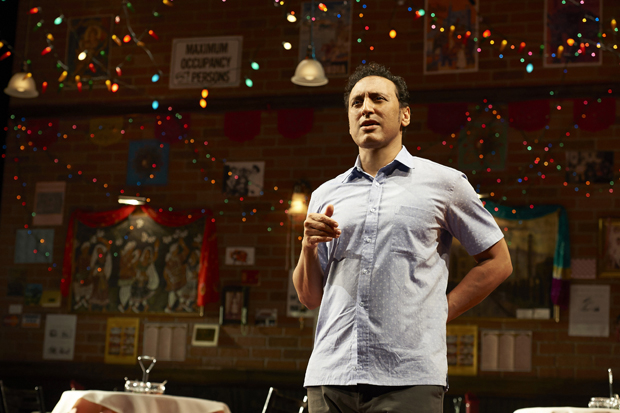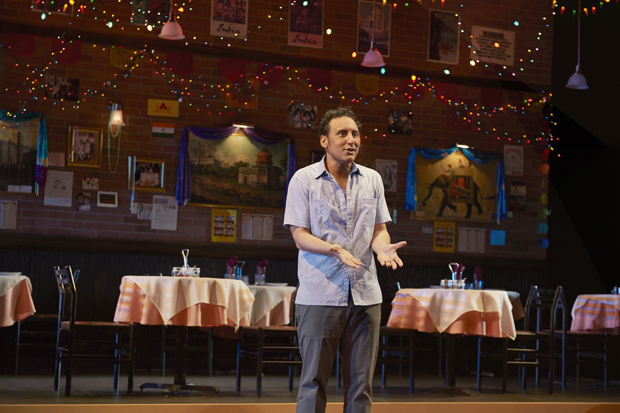Aasif Mandvi and Kimberly Senior Tell an American Story in Sakina's Restaurant

(© Marion Curtis)
Aasif Mandvi has come a long way since he first performed his solo show Sakina's Restaurant at the American Place Theater in 1998, with successes including snagging a regular spot on The Daily Show and coproducing HBO's The Brink. And America has come a long way too – but maybe in the wrong direction.
That's why Mandvi was skeptical when he was approached by Audible about remounting the show, both as an audio book and as a stage play. "I thought why would I do that? It's 20 years old," said Mandvi during a recent interview. "I hadn't really looked at it in a decade or so," he continued, "and when I looked at it again, I thought there is something here that is relevant to the national conversation that's going on now."
Mandvi got in touch with director Kimberly Senior, who had directed him in the world premiere of Ayad Akhtar's Pulitzer Prize-winning Disgraced in 2012, and together the pair began to reopen Sakina's Restaurant.
"It was exciting to me to revisit something with someone when I hadn't been there for the original — understanding how [Aasif] has changed as an actor and how has the world changed in terms of how we receive this piece," said Senior, " Aasif's deftness with the material was very exciting to me, and to know that we could go that much further with it."

(© Lisa Berg)
Why did you originally write Sakina's Restaurant and does it still have the same effect?
Aasif Mandvi: When I first wrote it, I wanted to write characters that represented an experience that came from my DNA, that came from the immigrant story. I wasn't seeing any of that. So I decided, I'm going to write my own play and write the characters that I want to play in a story that I want to tell.
Twenty years later we have much more representation in the culture now. The frustrating part sometimes is even now you see the politicization of immigrants and Muslims and you see that obviously on the conservative right but even on the progressive left. I feel like when you write a play like August: Osage County, you don't have this kind of conversation about, "Oh how are these white people in Oklahoma compared to the Trump supporters who are now in Oklahoma?" We're still unable to disassociate from that politicization of immigrants and Muslims and people that are not the, quote, unquote, "normal." So I feel like what I'm trying to do now is tell a human story, we need as a counter to everything that's going on. Just a story about a family and about people and about human beings who happen to be Muslim, who happen to be brown, who happen to be immigrants and they're telling this American story.
How does it feel to put Sakina's Restaurant back onstage?
Aasif: A lot of what we see in our culture now is this dehumanization of immigrants by virtue of politicizing them. And this play, it's not a political play. It's a play about an immigrant family dealing with the experience of being immigrants and their family dynamics. So by virtue of that, it felt to me like its own political act by putting these people onstage and telling a story about Muslims and immigrants that is not political.
Kimberly Senior: At this point I feel like it is an active reminder of our potential of humanity, because it feels like a history play. That was a moment in history that we need to like look back on to remember we can do better. And it does feel like there is a call to action in it in that we have to be better.
Aasif: The character of Azgi is I guess an exaggerated version of myself when I came to America as a teenager. There was a kind of wide-eyed sort of optimism and hope of coming to this place. So in Azgi, there is this optimism and hope, but 20 years later now it does seem in some ways like, oh, we've lost that. I don't feel like my parents would have come to America today — they probably couldn't have come today — with the same hopes and dreams they had coming to America in the '80s.
What was it about your partnership on Disgraced that made you excited to work together again?
Kimberly: Having worked with a bunch of actors, in a creative partnership there's people who get you and people who don't and I feel like Aasif and I have always understood each other on like a metabolic level, you know, there's like an equal mix of humor and excellence we're both going for at all times. There's a stylistic and ethical approach that I think we share that we're able to draw from as a solid foundation. So he can trust me when I say like, "Don't do it that way anymore or let's revisit this."
Aasif: I think what Kimberly brought to it was so much thoughtfulness and depth in each character and in the story telling. She helped me also get rid of a lot of the ornamentalization of the show. One thing that is different is that, 20 years ago this was the first time American theater audiences were seeing Indian people and stories about Indian Muslim characters onstage, so we had to kind of spoon-feed them a lot more. That's not as true now. So now we can actually delve into it in a way that's more subtle, more nuanced, and sit in the emotions, in the sadness of it, and the joys of it in a more complex way.
Kimberly: I feel like Aasif and I have a sort of engine that is constantly churning between us. He's an incredibly grounded human being despite the fact that he is such a gifted performer. So that's also really fun, to have him bringing his humanity to everything that he does. I've referred to him as a wizard, a shape-shifter. It's getting more and more superlative. But the thing is it's also really true. There's not a lot of ego with the two of us and so it's a really fun working environment.

(© Lisa Berg)










